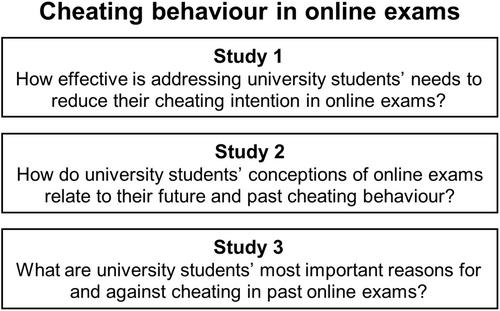Cheating behaviour in online exams: On the role of needs, conceptions and reasons of university students
Abstract
Background
Online exams have become a more common form of assessment at universities due to the Covid-19 pandemic. However, cheating behaviour in online exams is widespread and threatens exam validity as well as student learning and well-being.
Objective
To better understand the role of university students' needs, conceptions and reasons regarding cheating in online exams.
Methods
In Study 1, we used four pairs of contrasting online exam scenarios to explore the impact of addressing students' needs on their cheating intention. In Study 2, we examined how students' conceptions of online exams are related to their cheating behaviour. In Study 3, we asked students to name their most important reasons for and against cheating in past online exams. All studies were conducted online and are based on a convenience sample of 339 students from universities in Germany.
Results and Conclusions
First, students were less likely to cheat when they expected exam content relevant to their future profession, exam tasks relevant to their future professional life and detailed feedback on their performance. Second, most students' conceptions of online exams were related to their cheating intention and behaviour, whereas the conceptions that online exams support teaching, promote collaboration and impair learning were of relatively high importance. Third, most important reasons for cheating included the relevance of grades and the unfairness of exams, and most important reasons against cheating included moral standards and values as well as the fear of consequences.
Implications
Addressing students' needs and considering their conceptions and reasons could be a learner-centred approach to decrease cheating behaviour.


 求助内容:
求助内容: 应助结果提醒方式:
应助结果提醒方式:


